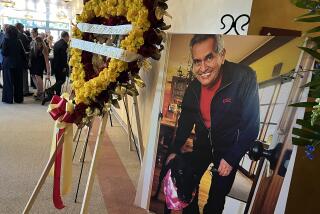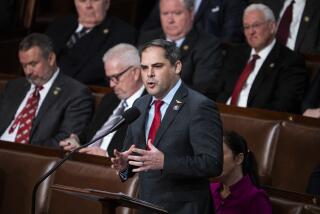Willis Edwards dies at 66; L.A. civil rights activist
Willis Edwards, a civil rights and political activist in Los Angeles’ African American community and the former leader of the Beverly Hills-Hollywood branch of the NAACP who was a controversial force behind its entertainment industry Image Awards, has died of cancer. He was 66.
Edwards died Friday at Providence Holy Cross Medical Center in Mission Hills, a hospital spokeswoman confirmed.
Edwards was well known in local and national African American and Democratic Party circles as a brash yet endearing “fixer” who worked on many elections, including the 1988 presidential campaign of the Rev. Jesse Jackson. He was able to charm and push his way through potential roadblocks to make crucial introductions or maneuver someone he admired into the best photo opportunity. Among his favorite efforts, he played an important role in securing national honors for civil rights hero Rosa Parks late in her life and seating her next to First Lady Hillary Rodham Clinton when President Clinton delivered the 1999 State of the Union address.
“Willis was really a creative genius. He could gain access to the White House or to any chamber he wanted to. He could get doors open that others couldn’t,” said former U.S. Rep. Diane Watson, for whom Edwards worked as a volunteer and paid consultant in elections dating back to her races for a seat on the Los Angeles school board and state Senate in the ‘70s. “He was a connector, he was a doer. There was nothing impossible for Willis.”
Except for an unsuccessful run in 1978 for a state Assembly seat, Edwards mainly stayed behind the scenes, but his motivation always was about civil rights, Watson said Saturday. “He saw how it would feel to be left at the back of the line, and he just wasn’t going to have that,” she said.
L.A. Mayor Antonio Villaraigosa also praised Edwards. “The legacy of Willis Edwards is that he made the impossible possible; he fought the unjust for justice; he spoke boldly in the places of silence; and he stood tall and fearless as a leader when others cowered,” Villaraigosa said in a statement.
Beyond racial discrimination, Edwards fought another battle later in life. He nearly died of AIDS 15 years ago, at a time when even some people in the civil rights movement considered HIV a taboo subject. Edwards, who was single and never publicly discussed his sexuality or how he contracted HIV, recovered thanks to new drugs and in 2001 spoke at a national convention of the National Assn. for the Advancement of Colored People about the hardships of living with HIV.
The organization’s national chairwoman, Roslyn M. Brock, on Saturday said that Edwards, who served on the NAACP’s national board for more than a decade, “promoted and protected the image of African Americans in the arts ... and he tore down barriers to honest conversation about HIV/AIDS in communities of color.”
Edwards was elected president of the NAACP’s Beverly Hills/Hollywood branch in 1982. He persuaded then-NBC President Brandon Tartikoff to nationally televise the group’s Image Awards, a movie star-studded event that focused on raising the profile of blacks in front of and behind the cameras in Hollywood. But later, Edwards tangled with a black TV star.
In 1988, comedian Arsenio Hall called Edwards an “extortionist” and “tennis-shoe pimp” and alleged Edwards threatened to publicly complain that Hall had not hired enough blacks to work on his talk show unless Hall gave $40,000 to the NAACP. Edwards filed a defamation lawsuit against Hall that, Edwards said, was eventually settled for a substantial sum.
Edwards was reelected branch president in 1989 but resigned later that year amid criticism that the group’s finances were not properly managed and that he took a $25,000 payment to help produce the Image Awards.
Friends described Edwards as living modestly in a Hollywood apartment, uninterested in luxury but thriving on access to celebrity and power. In a 2002 profile of Edwards in the Los Angeles Times Magazine, reporter John L. Mitchell described how Edwards elicited both admiration and contempt “for being a man who, without wealth or political office or a car or a 9-to-5 job, through raw gifts and sheer guff, insinuated himself into the highest levels of influence.”
Born in Texas in 1946, Edwards was raised in Palm Springs and enrolled at Cal State L.A., where he was the first African American to be elected student body president. Drafted by the military, he was slightly wounded in a land mine explosion in the Vietnam War and was awarded a Bronze Star. He later worked as director of black student services at USC.
Edwards became active in Sen. Robert F. Kennedy’s 1968 presidential campaign and was in the Ambassador Hotel celebrating his victory in the California Democratic primary when Kennedy was assassinated. He was a political ally of Tom Bradley, Los Angeles’ first black mayor, who appointed Edwards to the city’s Social Service Commission in 1973.
As he struggled to recover from AIDS-related weight loss and other problems in the late ‘90s, Edwards was visited by Parks. Revered for refusing in 1955 to give up her seat on an Alabama bus to a white passenger, Parks sought Edwards’ help for her civil rights institute. He generated publicity for her and escorted her down the red carpet at the Academy Awards in 1998. Besides playing a role in allying her with the Clintons, Edwards helped lobby for Parks to receive the Congressional Gold Medal and for her casket to lie in honor in the Rotunda of the Capitol in Washington after her 2005 death. “Rosa Parks stands for something,” he told The Times in 2002.
Edwards is survived by a sister, Brenda, and a brother, Frank, along with nieces and nephews. Funeral arrangements are pending.
More to Read
Start your day right
Sign up for Essential California for the L.A. Times biggest news, features and recommendations in your inbox six days a week.
You may occasionally receive promotional content from the Los Angeles Times.




















































